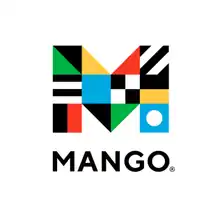Mango Languages
Mango Languages is an American online language-learning website and mobile app based in Farmington Hills, Michigan for academic institutions, libraries, corporations, government agencies, and individuals.[1][2][3] A Mango membership can be free at local libraries,[4][3] or a membership costs $7.99 per month for one language or $17.99 per month for access to all 71 languages.[3]
 | |
| Founded | 2007 |
|---|---|
| Founder | Jason Teshuba, Mike Teshuba, Ryan Whalen and Mike Goulas |
| Headquarters | Farmington Hills, Michigan |
| Website | www |
History
Jason Teshuba, Mike Teshuba, Ryan Whalen and Mike Goulas founded the service in 2007.[1] Jason Teshuba serves as the CEO of Mango Languages.[5][6]
As of April 2019, Mango Languages offers 71 language courses. Additionally, the service offers English lessons in 17 languages and specialty courses to teach cultural differences.[7]
Mango Languages employs organic language acquisition and emphasizes learning grammatical principles through realistic conversations; features include interactive lessons, spaced repetition, reinforcement exercises, color-coded translations, video content, and Google Translate integration.[8] Another feature allows users to record their pronunciation and compare a visual image of its waveform to that of a native speaker's.[9][10] Courses are accessible from a web browser or an app, and progress can be synced across devices.[8][11]
In 2013, Mango Languages earned $7.9 million in revenue.[1] In June 2019, Mango launched a new brand identity and released “major advancements to its platform,” including “new personalized, adaptive, conversation-based lessons in over 70 languages for web, iOS, and Android.”[12] Mango Languages offers licenses for its software to libraries, schools and other institutions. [8]
Languages
As of April 2020, Mango offered courses in the following languages:[3]
Arabic: Modern Standard
Arabic: Egyptian dialect
Arabic: Iraqi dialect
Arabic: Levantine dialect
Aramaic: Chaldean
Armenian
Azerbaijani
Bengali
Cherokee
Chinese: Mandarin
Chinese: Cantonese
Chinese: Shanghainese
Croatian
Czech
Danish
Dari Persian
Dutch
Dzongkha (Bhutanese)
Filipino: Tagalog
English
English: Shakespearean
Finnish
French
French: Canadian
German
Greek: Modern
Greek: Ancient
Greek: Koine (Biblical)
Haitian Creole
Hawaiian
Hebrew: Modern
Hebrew: Biblical
Hindi
Hungarian
Icelandic
Igbo
Indonesian
Irish
Italian
Japanese
Javanese
Kazakh
Korean
Latin
Malay
Malayalam
Norwegian
Pashto
Persian
Polish
Portuguese: Brazilian
Potawatomi
Punjabi
Romanian
Russian
Scottish Gaelic
Serbian
Slovak
Spanish: Castilian
Spanish: Latin American
Swahili
Swedish
Tagalog
Tamil
Telugu
Thai
Turkish
Tuvan
Ukrainian
Urdu
Uzbek
Vietnamese
Yiddish
As a novelty, Mango also offers a short course in "Pirate."[3]
See also
References
- "Mango Languages Finalist: $5.1 million to $30 million". June 8, 2014. Retrieved August 13, 2015.
- "Library Linguistics". August 4, 2014. Retrieved August 13, 2015.
- "Mango Languages Review". PCMAG. Retrieved 2023-03-16.
- "Mango Languages". The New York Public Library. Retrieved 2023-03-16.
- "You are what you speak: Mango Languages". April 29, 2014. Retrieved August 13, 2015.
- "Mango offers language learning online". September 20, 2007. Retrieved August 13, 2015.
- McLaughlin, Pamela (July 27, 2015). "Mango Languages- New Language Learning Tool Now Available". Syracuse University Libraries. Archived from the original on September 9, 2015. Retrieved January 18, 2016.
- D, Stevie (2019-07-10). "Mango Languages Review: A Practical and Comprehensive Look at the Program". FluentU Language Learning. Retrieved 2021-11-13.
- Henrichsen, Lynn E (October 17, 2020). "An Illustrated Taxonomy of Online CAPT Resources". RELC Journal. 52 (1): 179–188. doi:10.1177/0033688220954560. ISSN 0033-6882. S2CID 228981180.
- Bajorek, Joan Palmiter (May 2017). "L2 Pronunciation in CALL: The Unrealized Potential of Rosetta Stone, Duolingo, Babbel, and Mango Languages". Issues and Trends in Educational Technology. 5 (1): 37.
- "Libraries branch out with Mango language software". December 29, 2009. Retrieved August 13, 2015.
- "Mango Languages Sprouts a Sweet Relaunch". August 9, 2019. Retrieved October 8, 2019.